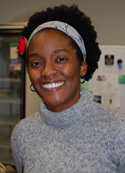
Assistant Professor Jada Benn Torres uses genetics to research the distribution of diseases across populations, with a primary focus on women’s reproductive health. Notre Dame’s first molecular anthropologist, she recently celebrated the opening of her laboratory, where tools and techniques developed in molecular genetics are brought to bear on anthropological questions.
This is an important new venture for Notre Dame’s Department of Anthropology, which is considered among the most innovative in the nation.
Research in Demand
“Many parts of the biological and medical sciences are being transformed because DNA has become so much easier to study than it was in the past, and biological anthropology is no exception,” says Professor Mark Schurr, the department’s chair. “The ‘nature vs. nurture’ problem is fundamental to anthropology. In other words, how much of what we are is due to genetics and how much to our environment? Molecular anthropology is at the leading edge of these types of studies, and we are thrilled our department is able to participate in this important research and teach our students how it is done.”
With her current project, Benn Torres is investigating why uterine fibroids tend to develop at a younger age and with more severity among African-American women than in other populations. She believes understanding genetics, which can help with decoding what happened in the past and reconstructing populations and their relationships with their environments, will prove an important piece in solving this puzzle.
“We don’t know if it’s lifestyle or a combination of lifestyle and some genetic factor,” she says. “I want to examine the variation in genes involved in fibroids among African-Americans and Africans and compare it to other groups to determine if there are any evolutionary reasons those groups are more predisposed.”
A 1999 Notre Dame graduate who joined the department’s faculty in fall 2008, Benn Torres earned her doctorate from the University of New Mexico, where she initially studied osteology and forensics. She discovered her true calling when a molecular anthropology lab began taking volunteers, and she decided to give it a try.
“I liked the immediacy of the results,” she says. “You get your sample, run your analysis, and quickly get your answer.”
Family Roots
Benn Torres’ parents were born in Trinidad, and her father’s stories about their ancestors inspired her dissertation research on population history in African-Caribbean communities.
Exploring the bio-geographical ancestry of places such as Trinidad, Dominica, Saint Vincent, Grenada, Saint Kitts, and Saint Lucia, she identified West African, Native American, and European origins throughout the islands. Her research highlighted the role blended communities played in the formation of contemporary African-Caribbean populations.
Benn Torres has already initiated an “Introduction to Anthropological Genetics” course, the first of its kind at Notre Dame, and she is looking forward to the coming semester when she will teach “Molecular Methods in Anthropology,” a class in which students use their own DNA to learn the various techniques applied in molecular anthropology.
“By the end of the class,” she says, “the students should be able to place themselves on the tree of humanity.”


